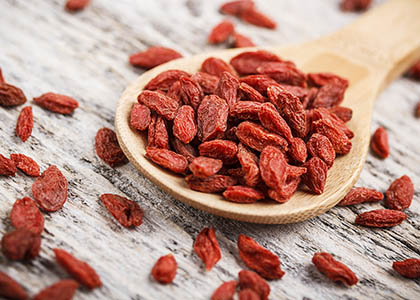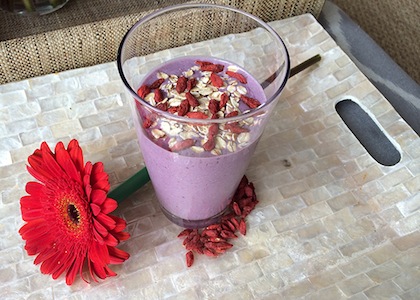
9 Big Benefits of a Little Red Berry
By Claire Georgiou, Reboot Naturopath, B.HSc ND
Goji berries (Lycium barbarum), also called wolfberries or nicknamed the ‘longevity fruit’, are one of the most popular superfoods right now. A native to the Himalayan Mountains of Tibet and Mongolia, the goji berry is now grown in many other countries due to its growing popularity. The’ve been consumed for thousands of years in China and Tibet. Traditionally, goji berries were boiled and used in sweet and savory dishes and utilized in Chinese medicine to treat a number of health ailments. Goji berries are often added to soups, congee, desserts, drank as a tea and consumed for good health. There are even some traditional wines that are made from the goji berry. Now they are a popular addition to smoothies, healthy desserts and a perfect topping to your chia seed pudding.
Here are 9 reasons why you should have goji berries in your pantry:
- High in Protein and Fiber
Goji berries are high in protein, more than any other fruit. They are 15% protein and 18% fiber. So for a standard serve of 10 – 30g of these dried berries in a smoothie or in a dish they provide up to 4.5g of protein and 5.4g of fiber.
- Nutrient Dense
For their tiny size, goji berries are particularly high in iron, potassium, vitamin C, B vitamins and Vitamin E. Goji berries also contain many trace minerals and all of the 21 amino acids.
- Slow the Aging Process

Goji berries have a high Oxygen Radical Absorbance Capacity (ORAC), a test developed by the U.S. Department of Agriculture to rate how much antioxidant power a food has. Foods with a high ORAC value may help to slow the aging process and to protect cells from oxidative damage from free radicals. Goji berries had a high rating of 3290.Without an ample supply of antioxidants our body becomes pre-disposed to illness and accelerated aging. Free radicals are generated as a by-product of normal metabolism, exposure to toxins and environmental pollutants. Free radicals can contributed to a variety of diseases.
- Boost Eye Health
Goji berries are high in carotenoids particularly zeaxanthin and lutein, which ensures the health of the eye. In one study, goji berries were found to reduce the risk of developing age-related macular degeneration, which is an eye condition that can cause vision loss and blindness in older adults.
- Cancer Prevention
The polysaccharides found in goji berries may stop stem cell cancer activity by causing cell apoptosis (cell death) as well as interfering with cancer cell proliferation rate and cycle distribution.
- Improve Bblood Sugar and Triglyceride Levels
An animal study showed that goji berries may reduce elevated blood sugar levels as well as reduce cholesterol and triglyceride levels.
- Increase Immune Health
Goji berries offer immune and anti-inflammatory support due to the high level of nutrients, antioxidants, carotenoids and polysaccharides. Polysaccharides have been found to be invaluable for the benefit of the immune system. In one study goji berries helped stimulate more antibodies and a stronger immune response to the flu.
- Protection Against Liver Damage
One study also demonstrated that the polysaccharides and zeaxanthin extracted from goji berries protect against liver damage.
- Prevention Against Alzheimer’s Disease
Goji berry extract protected the brain neurons of animals from the toxic effects of beta amyloid protein, a culprit in the development of Alzheimer’s disease. Goji berries show great promise in the protection of neurological health.
Based on scientific studies, we know that goji berry’s unique polysaccharides provide potent antioxidant effects and anti-cancer, immune-stimulatory, and cytoprotective benefits. Those are all pretty good reasons to start enjoying more of them.
Goji berries are fun to use in many dishes including smoothies, salads and smart desserts.
Here are some great Reboot ways to enjoy goji berries:
- Fruit and Nut Haystacks

- Joe’s Hiking Fuel: A Recipe for Delicious Granola
- It Tastes Just Like Berry Pie
- Cacao-Nut Mango Smoothie
- Berry Oats & Goji Spring Smoothie
- Goji Sunshine Salad (Ready in 5 minutes!)
- Blueberry & Goji Smoothie Bowl
- Fuhrman’s Goji Walnut Squares with Chocolate Drizzle
- Fire Engine Red Smoothie
- Hail to Kale Salad
- Sunflower-Goji Cookies
NOTE: It has been advised to be careful of goji berries if you are taking blood thinning medications, blood pressure or diabetic medication. It is best to talk to your doctor or health-care professional if unsure.